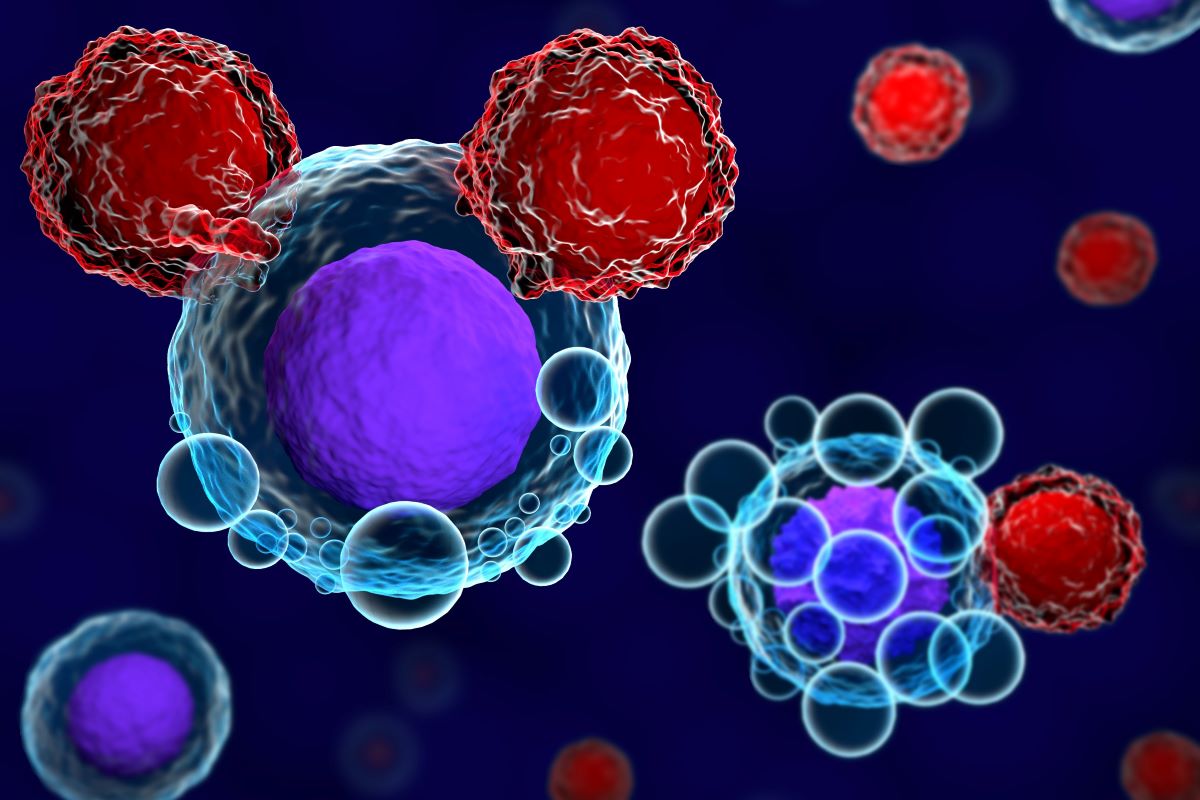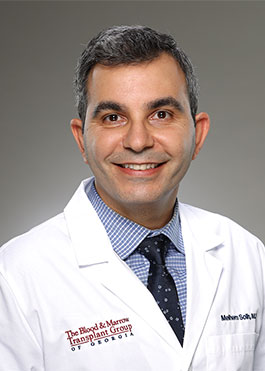
Dr. Melhem Solh, medical director of the cellular therapy program at Northside Hospital, answers common questions about CAR T-cell therapy and discusses its role in the treatment of cancer.
What is CAR T-cell therapy and how does it work?
Dr. Solh: CAR T-cell therapy, or chimeric antigen receptor T-cell therapy, is an advanced form of cancer treatment that uses the body’s own immune system to fight cancer cells. A patient’s own T-cells are engineered to find and destroy cancer cells. When the cells are infused back into the patient, they will attack the cancer and get rid of it.
The process begins by collecting the patient’s T-cells. These T-cells are sent to a lab, where they’re engineered to achieve two goals: First, to add a receptor on the surface of the T cells that will make it easier for them to find the cancer and second to make these cells more potent at getting rid of cancer. Depending on the particulars, this process can range from two to six weeks. While the patient waits for the manufactured T-cells, we do our best to ensure the cancer does not progress. This stage of the patient’s treatment is called bridging therapy. Once the manufactured cells are ready, the patient undergoes low-dose chemotherapy for five days before they receive the new cells. Once these new cells are administered, the new immune cells begin to multiply and will attack the cancerous, mutated cells.
What is the first step in considering whether CAR T-cell therapy is right for a patient?
Dr. Solh: The first step is determining if the patient is eligible for this treatment based on many factors including the cancer state, the patient's overall health and organ function. Currently, CAR T-cell therapy is approved for certain types of lymphoma, acute leukemia, and multiple myeloma patients.
If a patient does have one of those types of cancers, does that automatically mean they can ask their doctor for this treatment?
Dr. Solh: Not necessarily. A candidate’s suitability is determined by three things.
First, as I mentioned, by the disease they are afflicted with. Physicians must verify if the cancer the patient has can be treated with CAR T-cells and if a patient has received enough previous treatment to qualify for this type of therapy. CAR T-cell therapy is not a first-line treatment. Some CAR T-cell therapies have different requirements based on how long a patient has been treated and if they have passed FDA approval.
If the patient qualifies from this standpoint, doctors will analyze the patient's organ functions and performance. This analysis is called performance status. In this step, we determine if the patient has any measure of organ dysfunction and/or if they have an underlying condition that would make them ineligible for CAR T-cell therapy.
The third and final determination is social support. This determination asks doctors to verify that the patient will be able to travel back and forth to receive this kind of treatment because they have social support in place. Social support is crucial for cancer patients, as it serves as the backbone for their mental, physical, and emotional well-being during such a difficult and trying time.
Are there any associated side effects, and if so, what are they?
Dr. Solh: One major side effect of using CAR-T cell therapy could be cytokine release syndrome (CRS). This is a systemic inflammatory response that happens because of the cells attacking the cancer. Patients who experience CRS may experience fever, chills, shortness of breath or, in severe cases, a major blood pressure drop requiring intensive care admission.
Another side effect specific to this therapy is called immune effector cell-associated neurotoxicity syndrome (ICANS), which is considered neurological toxicity. It is a similar concept to CRS, in that the cytokine storm can affect the central nervous system. Patients can get sleepy or drowsy or, in severe cases, become unresponsive and develop seizures.
One other side effect may be that a patient’s blood count goes down for an extended amount of time because of the chemotherapy and the immune system’s activity, which may mean the patient needs to be supported with transfusions for several weeks.
How do the physician and nurse teams caring for these patients reassure them in case side effects present themselves?
Dr. Solh: Collaboration is inherent to this type of treatment; it takes a village. The whole hospital needs to know to identify that if a patient being treated with CAR T-cells comes to the ER with a fever, they may be seeing CRS so they can process the patient quickly as things can deteriorate fast. The collaboration is built on training the entire staff, from physicians and nurses to the transplant unit and those working in the ICU. Every specialty that sees CAR T-cell therapy patients must undergo risk evaluation and mitigation strategy training (REMS) to give these patients the best care Northside has to offer and to manage any side effects if they occur. The complications from CAR T-cell therapy are treatable, and most times the effects are reversible and patients will do okay, but they are still constantly monitored.
What does the recovery process look like?
Dr. Solh: While every patient’s situation is different, the acute recovery period is typically 30 days after the CAR T-cell infusion. Patients will need to be monitored closely for signs of infection, fever, and neurological changes, all of which can be complications of receiving this form of cancer treatment. Patients will need to rest and avoid strenuous activities.
Why should a patient choose Northside for CAR T-cell therapy?
Dr. Solh: Northside is one of only a handful of facilities in the Southeast with the capacity and facilities to appropriately manage the toxicity of immunotherapy agents. Northside has state-of-the-art diagnostic testing, advanced facilities, comprehensive patient-centered care, and the benefit of highly trained cancer physician experts. These are all essential components of the exceptional care our patients receive, resulting in outstanding survival outcomes and patient satisfaction. Northside is also one of the very few hospitals that can provide CAR T-cell therapy as an outpatient treatment option.
How long has Northside offered CAR T-cell therapy?
Dr. Solh: Northside started treating patients with CAR T-cell therapy before it was commercially approved. The program started with clinical trials in 2017 and has been a part of multiple studies that led to FDA approvals. This early treatment adoption allowed best practices to be established before they were commercially available. Now, we feel these best practices are what make Northside best equipped to deliver the care patients need and expect.
What has success looked like for Northside’s CAR T-cell therapy patients?
Dr. Solh: CAR T-cell therapy has come a long way in a short amount of time. It can act as the second-line treatment for patients whose previous treatment is no longer effective. Patients who had nothing else available would have previously been sent to hospice because their chemo stopped working. We’ve had patients who have been in situations like that and with CAR T-cell therapy, they saw response rates ranging from 70%-80% and in some cases, even 90%. What is more impressive, a sizeable percentage of these patients remained cancer-free for several years after treatment.
What are you excited for in terms of the future of CAR T-cell therapy?
Dr. Solh: My hope is that one day, CAR T-cell therapy will make its way to patients suffering from solid tumors ( lung cancer for example), giving more patients hope. We are still at the beginning of what this therapy can achieve but are working towards finding ways to mitigate toxicity and considering whether eligibility for CAR T-cell therapy can happen as an earlier line of treatment. I’m also excited by the research being done to advance what is called “dual-target CAR T-cell therapy,” and “off-the-shelf” CAR T-cell therapy. I think cell therapy will become a bigger part of cancer treatment in the future.
How do you feel about Northside’s CAR T-cell therapy program?
Dr. Solh: I feel very proud, not just about the current CAR T-cell therapy treatments approved, but what is still being developed and studied. I have been a part of every trial at Northside that received approval to move forward, and I am eager to expand Northside’s program and continue to see how medicine evolves and impacts more people.

